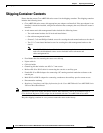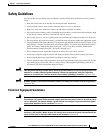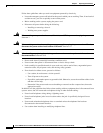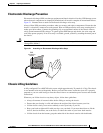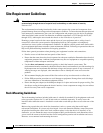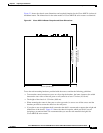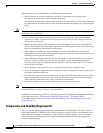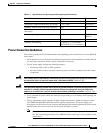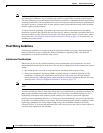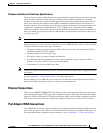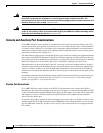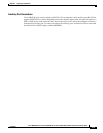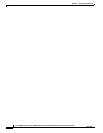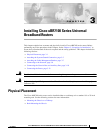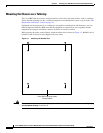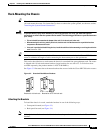
2-10
Cisco uBR7100 Series and Cisco uBR7100E Series Universal Broadband Router Hardware Installation Guide
OL-5916-01
Chapter 2 Preparing for Installation
Site Requirement Guidelines
Note The Cisco uBR7100 series router installation must comply with all applicable codes and is approved for
use with copper conductors only. If installing the router in a central office environment that requires
Telcordia grounding, the ground bond fastening hardware should be of compatible material and preclude
loosening, deterioration, and electrochemical corrosion of hardware and joined material. Attachment of
the chassis ground to a central office or other interior ground system should be made with a minimum
6-AWG, copper ground conductor.
To satisfy Telcordia grounding requirements, the chassis provides two threaded chassis grounding
receptacles, located on the sides near the rear of the chassis, which are intended to be bonded directly to
the central offices or other interior ground system. The chassis ground requires 3.5 mm screws, which
are included. See “Attaching the System Ground Connection” section on page 3-5 for instructions on
attaching the system ground.
Plant Wiring Guidelines
Following are guidelines for setting up the plant wiring and cabling at your site. When planning the
location of the new system, consider the distance limitations for signaling, EMC, and connector
compatibility, as described in the following sections.
Interference Considerations
When wires are run for any significant distance in an electromagnetic field, interference can occur
between the field and the signals on the wires. This fact has two implications for the construction of plant
wiring:
• Bad wiring practice can result in radio interference emanating from the plant wiring.
• Strong electromagnetic interference (EMI), especially when it is caused by lightning or radio
transmitters, can destroy the signal drivers and receivers in the router, and can even create an
electrical hazard by conducting power surges through lines and into equipment. (Review the safety
warnings in the “Electrical Equipment Guidelines” section on page 2-3.)
Note To predict and remedy strong EMI, you may also need to consult experts in radio frequency interference
(RFI).
If you use twisted-pair cable in your plant wiring with a good distribution of grounding conductors, the
plant wiring is unlikely to emit radio interference. If you exceed the recommended distances, use a
high-quality twisted-pair cable with one ground conductor for each data signal when applicable.
If wires exceed recommended distances, or if wires pass between buildings, give special consideration
to the effect of a lightning strike in your vicinity. The electromagnetic pulse caused by lightning or other
high-energy phenomena can easily couple enough energy into unshielded conductors to destroy
electronic devices. If you have had problems of this sort in the past, you may want to consult experts in
electrical surge suppression and shielding.



